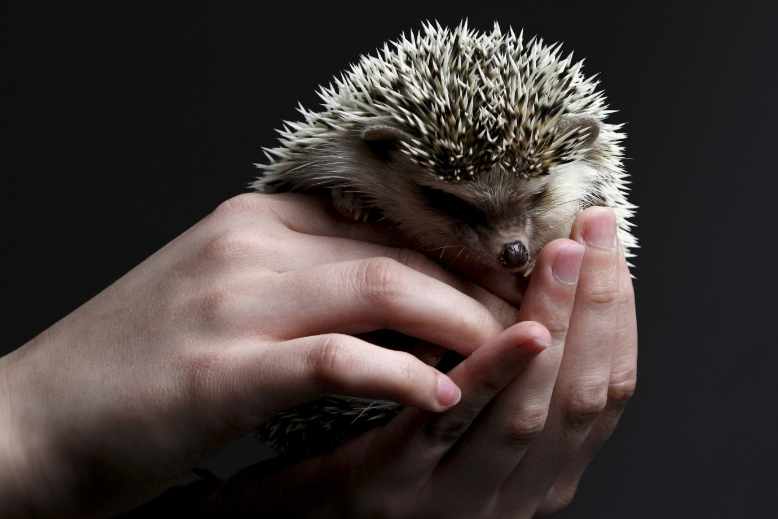
Do hedgehogs die easily? Hedgehog dying signs. Poor diet and diseases can affect the lifespan of a Hedgehog, and they can die easily. Some of the most common hedgehog dying signs are weight loss, loss of appetite, the difficulty of breathing, inability to roll up, confusion, laziness, weakness, bloody urine or poop, and body lumps. Hedgehogs can get sick and die for several reasons like old age, infections, dehydration, tumor, severe injuries, cancer, and not eating for a while.
Death is a devastating fact of life. And the death of a beloved pet is the hardest to forget. No situation is sadder than the departure of a loving pet, but it happens. The terrible feeling of not knowing what to do and what’s wrong with our adorable pet keeps us traumatized. That’s why any Hedgehog admirer needs to gather enough information to ensure they know how to help their sweet pet in troubled times. Plus, recognizing the Hedgehog dying signs is essential. It can help you act quickly and get your little buddy some help before it’s too late.
This article will assist you in telling if your lovable hedgehog is likely to cross the rainbow bridge. So, please keep reading to learn about the difference between a healthy, sick, and dying hedgehog to provide them with the care and comfort they need.
Hedgehog dying signs
Several signs indicate that your hedgehog is about to cross the great divine. Some of the most obvious signs are inactivity, lethargy, and loss of appetite. However, even if one or more of these signs occur, that doesn’t mean the hedgehog is passing away soon. Sometimes the little pet is just sick or is having a stressful time. So, it’s essential to tell the difference between a healthy, suffering, and dying hedgehog to act appropriately.
Signs of a healthy hedgehog

To recognize hedgehog dying signs, it is crucial to know what a healthy hedgehog looks like. By identifying your hedgehog’s normal behavior, you can tell if something is wrong. And if a vet visit is required.
A healthy hedgehog possesses the following characteristics.
- Healthy hedgehogs have bright open eyes.
- Your pet hedgehog’s behavior should be alert and responsive. Hedgehogs tend to stay alert. Plus, they don’t socialize that much. You may find your healthy hedgehog trying to hiss when touched. Even the well-socialized hedgehogs tend to stiffen up at the human touch.
- Hedgehogs don’t drag themselves around. They lift their belly off the ground while walking. So your pet Hedgehog should walk without wobbling and without any struggle.
- Piles of urine and poop are a sign of healthy digestion. You should find plenty of urine and in the cage.
- You can tell if your pet is healthy by the appearance of its feces. The poop should be brown. It needs to be well-formed and soft.
- Healthy hedgehogs love to eat. They have a good appetite and like to eat frequently.
- Healthy ones can ball up without any trouble.
- Your hedgehog is in good shape if its skin isn’t red, flaky, itchy, or crusty.
- Hedgehogs are night lovers (nocturnal). They sleep during the day and stay active throughout the night.
- Hedgehogs constantly sniff around. They like to explore their surroundings. You may find a healthy Hedgehog running, sniffing, and exploring about at night.
Signs of a sick hedgehog

Your spikey little pet is prone to certain diseases. Some of the conditions can be fatal, but your timely actions can reduce the risk of the terminal.
It’s essential for you to know what a dying hedgehog looks like. But it is equally imperative to understand the signs of hedgehog sickness to tell whether the disease is curable or not.
Below are some of the most apparent behaviors of sick hedgehogs. Observe daily and look for these symptoms to act quickly and save your little hedgie.
- Lack of activity
Healthy hedgehogs sleep throughout the day and stay alert at night. If your hedgehog isn’t active after napping for a whole day, it might be sick. You may need to keep an eye on your pet’s everyday activities.
Hedgehogs typically use their exercise wheels at night. But if your pet isn’t doing this anymore, you may need to think about its health.
If the lack of activity is combined with a loss of appetite, it’s something that requires a trip to the vet.
- Weakness and lethargy
Hedgehogs suffer from weakness and lethargy due to one of the following reasons
- Personality
- Old age
- Being tired
These are the reasons that you shouldn’t worry about. However, if this behavior is out of character, you should not ignore it. Plus, if your hedgehog is too tired to walk or exercise and prefers a 24-hour sleep, you need to be concerned.
- Weight loss and reduced appetite

Weight loss and reduced appetite are probably the most powerful indicators to tell you that something is wrong. After the sleep of an entire day, your hedgehog should eat and drink normally.
If your hedgehog is skipping its meals and its appetite has decreased, start your investigation and find out why that is happening. Keep an eye on your pet and observe if the situation gets any better in the upcoming days.
Decrease appetite leads to weight loss, so you should take it seriously. It is potentially harmful to the little one and is also one of the hedgehogs’ dying signs.
- Feces and urine
As a responsible pet owner, you should check on your pet’s litter box every day. A litter box filled with plenty of poop and pee is a sign of health.
Lack of feces and urine in the litter box indicates a health problem that needs your attention.
This situation can be temporary as a change in diet can result in different amounts of waste. But it would be best if you keep an eye on your hedgehog’s litter box for the next few days to make sure everything is alright. If there are still no signs of improvement, take your pet to a qualified veterinary doctor and investigate the reason for this behavior.
Along with the consistency and frequency of your hedgehog’s feces, you need to keep an eye on the appearance as well. If the feces appear green, tarry, black, or has mucous, immediately consult a vet.
Hedgehogs hold water in their body to fight disease. So, lack of urination indicates a disorder. These adorable pets are excellent at hiding their sickness. You may need to pay extra attention to their behavior.
- Bloody urine
This is one of the most apparent hedgehogs dying signs. If you find blood in your hedgehogs’ urine, immediately run towards a vet.
- Difficulty breathing
Hedgehog gasping for breath is a severe health problem. In this condition, it may seem like your buddy is having an adorable yawn. But in fact, a little animal attempts to catch its breath.
It can be a respiratory infection if a hedgehog is panting without any excessive workout or exercise routine. Difficulty breathing is a serious health concern, and it’s a possible dying sign as well.
- Eyes or nose discharge
Discharge from the eyes or nose is a worrying sign of illness. This can be a symptom of nasal infection. In some cases, this discharge can indicate tumors. Therefore, consultation from a qualified vet doctor is necessary to investigate the causes.
Hedgehog dying signs

The symptoms we talked about earlier don’t necessarily mean your pet is about to go the way of all flesh. Some of these symptoms, such as a change in appetite, toilet habit, and weakness, indicate that your pet is unwell and may require a veterinary checkup.
Hedgehog dying signs appear as a combination of multiple symptoms. For example, if your hedgehog isn’t eating, is getting weaker every day, and isn’t active anymore, it may indicate that your pet’s organs are shutting down and it is dying slowly.
It’s better to observe the symptoms and act accordingly before it’s too late to help. Never wait for your hedgehog to suffer anymore. Look for the signs and immediately consult a vet for a physical examination. Do some tests and find out the reasons.
Watch out for the combination of the following hedgehog dying signs
- Weight loss
- Appetite loss. Not drinking enough water.
- Lose, black, green, or tarry feces with mucus.
- Gasping, Shallow breathing, and painting
- Inability to roll up. Laying on one side.
- Walking in circles. Appearing aimless and confused
- Inability to walk in a straight line. Wobbling while walking.
- Inability to ball up
- Lumps on the body or head. Excessive growths in the body can be cancerous.
- Hedgehog Tumor
Sadly, these cuties are prone to cancerous tumors. Sometimes these tumors are physically visible. And you can observe a lump on your hedgehog’s body, head, or mouth. However, in some cases, no physical tumor is available to observe. Owners have to look for the symptoms pointing in the direction of cancer.
Early detection and immediate medical attention are vital. So, if you notice an unexplained symptom or a lump, act quickly and arrange a vet exam.
Most of the time, tumors indicate that your spiky pet is near the end of its days. It’s because even if the tumor is successfully removed, hedgehogs may still not survive. These are small animals, and they aren’t much resilient.
Unfortunately, if a Hedgehog is detected with a cancerous tumor, there isn’t much that we can do. In most cases, doctors recommend euthanizing the pet to save it from a painfully slow death.
Some pet hedgehogs suddenly pass away. In such cases, you can request an autopsy to determine the cause of death.
- Hedgehogs splatting behavior

Splatting behavior is when a hedgehog lies on its belly with its legs out on the sides. This behavior is a possible symptom of an underlying health issue. Generally, it is related to nervous system concerns but can point out overheating and heatstroke.
Hedgehogs show this behavior when they aren’t able to control their limbs. Splatting becomes the only way for a sick hedgehog to position itself. Heatstroke is another reason that can make a hedgehog splat. Because overheating reduces the energy levels, and the little fellow can’t curl up into a ball anymore.
Heatstroke can be fatal. It can cause extreme body damage if not checked by a veterinarian on time.
Splatting doesn’t necessarily mean the hedgehog is severely ill. Hedgehogs can show this behavior when they are incredibly exhausted. But excessive splatting is a red alert.
What to do if a Hedgehog is dying?
Well. Knowing that your beloved hedgehog is dying is depressing. But here we stand with only two options
- Try to comfort your pet in its last days. You can also consult different vets in an attempt to prolong their life.
- Euthanize the hedgehog before the tumor ruptures. It will prevent any suffering.
How to comfort a dying Hedgehog

If your hedgehog is dying and you can’t think about euthanizing, there are a few steps you can follow to comfort the little one.
- Use TLC and antibiotics to ease the pain.
- You can purchase Pedialyte to keep your pet hydrated. The use of Nutrical can also provide your hedgehog with some strength.
- Keep a water bottle filled with warm water next to your hedgehog when it sleeps to provide some warmth. The warmth might improve their weakness.
- If your hedgehog is unwell, try putting it in a quiet room. It will help the pet avoid any unnecessary stress.
- Feed your hedgehog with a syringe. Offer easy-to-digest food.
You can use a combination of these tips to take proper hedgehog care. If your hedgehog is still not feeling any different, considered euthanizing. It will save your pet from a long and painful death.
Wrapping up
Hedgehogs are adorable pets. But these small mammals are prone to cancerous tumors that can lead them to death. For Hedgehog lovers, it is vital to understand the hedgehog dying signs to act quickly.
If your beloved pet shows any symptoms, act quickly and take your hedgie to a qualified vet for further diagnosis. Don’t underestimate any sign. Remember, a quick road trip to the vet or a timely call can save the life of your hedgehog.


